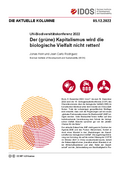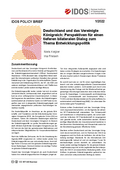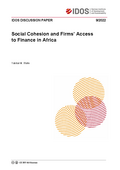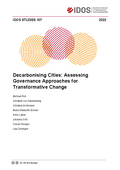-

Publikationen
Photo: www.shutterstock.com/de/image-photo/pont-du-gard-old-roman-aqueduct-45688924
Publikationen
Das German Institute of Development and Sustainability (IDOS) gibt vier eigenständige Publikationsreihen heraus. In Discussion Papers, Policy Briefs und Studies veröffentlichen die Wissenschaftler*innen des IDOS ihre aktuellen Forschungsergebnisse. Auch Gastwissenschaftler*innen und Kooperationspartner haben die Möglichkeit, ihre Forschungsergebnisse in einer der IDOS-Reihen zu publizieren. Publikationen der 2022 eingestellten Reihen Analysen und Stellungnahmen, Briefing Paper sowie Two-Pager / Zweiseiter sind weiterhin online verfügbar. Die vierte Publikationsreihe ist für Meinungsbeiträge vorgesehen: Regelmäßig kommentiert die Aktuelle Kolumne die neuesten Entwicklungen und Themen der internationalen Entwicklungspolitik.
Wissenschaftler*innen des IDOS veröffentlichen ihre Forschungsergebnisse zudem regelmäßig in referierten und nicht referierten deutschen und internationalen Fachzeitschriften und Publikationsreihen anderer Forschungseinrichtungen und Institutionen sowie bei renommierten Buchverlagen. Zusätzlich nutzen sie Blogs und Online-Plattformen der Partnerinstitutionen, um die Forschungs- und Beratungstätigkeit des Instituts einer interessierten Öffentlichkeit zu vermitteln.
Es wurden 9409 Ergebnisse gefunden. Zeige Ergebnisse 4381 bis 4390 von 9409.
-
Women's political role and poverty in the educational dimension: a district-level anlysis in India
-
Is the Earth flat or is it a cube? European foreign aid, political conditionality and democracy
-
Post-2015: how to design goals for (inter)national action?
-
Aid on the edge of chaos: review
-
Letzte Chance: der arabische Frühling scheint beendet, aber in Tunesien kann sich die Demokratie noch durchsetzen
-
Lorbeeren und Leviten: Deutschland in der Umwelt- und Entwicklungspolitik der Vereinten Nationen
-
Last hope: the Arab spring seems to have failed but democracy could yet prevail in Tunesia
-
Die WTO nach Bali – neue Hoffnung für den Multilateralismus?
-
Allocating the next European Development Fund for ACP countries
-
Post 2015: why the development finance debate needs to make the move from quantity to quality















